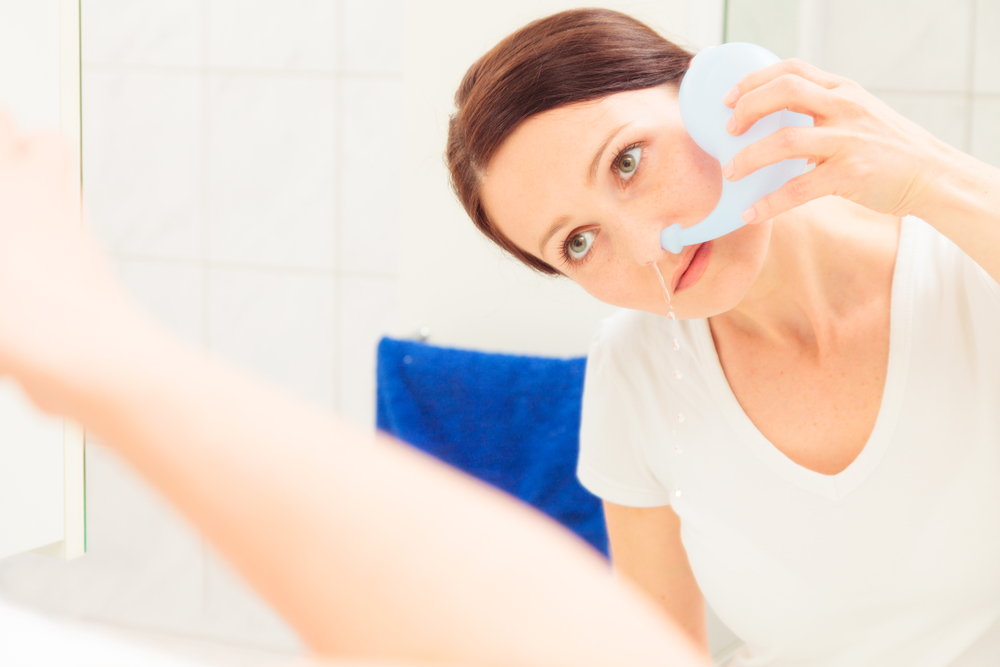Posted by: Maryland ENT in General
Do you have facial pressure or pain? Does your face feel tender to the touch?
This could be a result of sinus problems. Sinus pressure can be very uncomfortable and painful.
Keep reading to learn more about how to remove sinus pressure.
What is Sinus Pressure?

Sinuses are the air-filled cavities in your face. Sinus pressure occurs when your sinuses are inflamed and blocked.
It may result from sinus infections, colds, or allergies, which can cause your sinuses to become inflamed or swollen. This can lead to sinus pressure and pain.
Additionally, the inflammation can block your sinuses and increase mucus production. Without an exit, the excess mucus can get trapped and build up, also leading to pressure and pain.
The symptoms of sinus pressure include:
- A deep, dull ache or throbbing pain around the forehead, nose, cheekbones, and eyes
- An ache or pain that spreads to the scalp, jaws, and teeth
- A sensation of fullness in the face
- Nasal congestion or stuffiness
- Facial tenderness
- Pressure or pain that worsens when you bend over
How Can You Relieve Sinus Pressure?
You can alleviate sinus pressure with at-home treatments such as:
Nasal Irrigation

Nasal irrigation can relieve sinus pressure by clearing clogged sinus passages. It involves using a saltwater or saline solution, which is available in most drug stores.
Nasal irrigation can be done with a neti pot, bulb syringe, or special squeeze bottle. You’ll need to stand over a sink, tilt your head at a 45-degree angle, and squirt or pour the solution into one nostril.
This will ensure it flows out of the other. Repeat the process with the other nostril.
Nasal irrigation flushes away irritants and bacteria that can cause inflammation. Additionally, it clears thick mucus from your nose and sinus pathways.
You can begin with one irrigation per day. Remember to thoroughly clean your neti pot after every use to prevent bacteria buildup that can infect your sinuses.
Stay Hydrated
Dehydration can worsen sinus pressure. So, ensure you drink plenty of water throughout the day to remain hydrated.
Water will thin your mucus and keep it flowing, which can help decrease blockages in your sinuses. Non-caffeinated herbal teas, stews, broths, soups, and water-rich foods like watermelons, cucumbers, and apples can also help with hydration.
Avoid alcoholic and caffeinated beverages, as they can lead to dehydration.
Over-the-Counter Medication
Various types of over-the-counter medications can alleviate the discomfort and pain of sinus pressure, including:
Pain Relievers
Pain relievers such as naproxen, acetaminophen, and ibuprofen can relieve the pain caused by sinus pressure.
Decongestants
Decongestants can lower inflammation and swelling in your nasal passages, easing congestion and sinus pressure. They’re available in nasal spray or pill form.
Decongestant nasal sprays should only be used for 3 days at most to avoid worsening congestion. Moreover, oral decongestants shouldn’t be used for over a week without consulting your ENT specialist.
Antihistamines
If allergies are the underlying cause of your sinus pressure, antihistamines may relieve your symptoms. Antihistamines can be used alongside a decongestant to manage severe symptoms.
Breathe Steam
To help open up your sinuses, you can boil water and put it in a bowl on a stable surface. Next, lean over it, keeping your face a few inches from the surface of the water to prevent burning yourself.
Then, cover your head with a towel and take deep breaths through your nose for a few minutes. Alternatively, you can take a hot, steamy shower and ensure the bathroom door is completely closed.
Breathing in steam can unblock your nasal passages and ease sinus pressure.
Prop Your Head Up

Your position when lying down can exacerbate or improve sinus pressure. Mucus pools when lying flat, which increases sinus pressure.
Conversely, sleeping, resting, or napping with your head raised above your heart can improve drainage and decrease sinus pressure.
Rest
It’s essential to avoid over-exertion and instead rest to decrease sinus pressure, help your body combat infection better, and speed up recovery. When your sinuses are inflamed, they produce excess mucus that can increase sinus pressure.
Resting minimizes swelling and inflammation in your sinuses, contributing to your sinus pressure. Extra rest also allows your body to conserve energy, repair itself, and recover, which enhances its ability to fight infection more effectively, easing sinus pressure.
When Should You See a Sinus Specialist?
You may need to visit your ENT specialist if your symptoms don’t improve within a week or two or worsen despite trying these at-home remedies. Persistent sinus pressure could indicate a serious issue that requires professional treatment.
A thorough assessment by an ENT specialist can determine the actual cause of your sinus pressure and enable them to provide the most effective treatment to lessen your symptoms.
Find Lasting Relief from Sinus Pressure and Pain
If your sinus pressure is not improving or worsening, our ENT specialists can help. After getting to the root of your sinus pressure, they can tailor an effective, personalized treatment plan to help you find long-term relief.
Are you struggling with sinus pressure? Schedule your appointment at Maryland ENT in Baltimore, MD, today!



